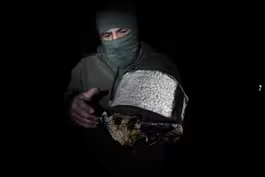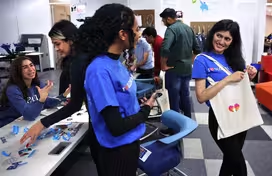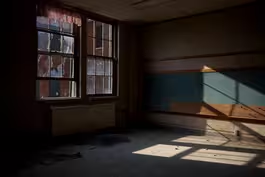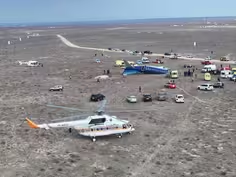
As Arctic warms, communities face dramatic changes
Clip: 12/26/2024 | 3m 57sVideo has Closed Captions
As Arctic warms, Indigenous communities there face dramatic changes to their way of life
Since the 1980s, temperatures in the Arctic have risen at nearly triple the global rate. This past summer was the wettest on record, while a heatwave in August set records in northern Alaska and Canada. Digital producer Casey Kuhn explains how the warming affects those who call the Arctic home.
Problems playing video? | Closed Captioning Feedback
Problems playing video? | Closed Captioning Feedback
Major corporate funding for the PBS News Hour is provided by BDO, BNSF, Consumer Cellular, American Cruise Lines, and Raymond James. Funding for the PBS NewsHour Weekend is provided by...

As Arctic warms, communities face dramatic changes
Clip: 12/26/2024 | 3m 57sVideo has Closed Captions
Since the 1980s, temperatures in the Arctic have risen at nearly triple the global rate. This past summer was the wettest on record, while a heatwave in August set records in northern Alaska and Canada. Digital producer Casey Kuhn explains how the warming affects those who call the Arctic home.
Problems playing video? | Closed Captioning Feedback
How to Watch PBS News Hour
PBS News Hour is available to stream on pbs.org and the free PBS App, available on iPhone, Apple TV, Android TV, Android smartphones, Amazon Fire TV, Amazon Fire Tablet, Roku, Samsung Smart TV, and Vizio.
Providing Support for PBS.org
Learn Moreabout PBS online sponsorshipWILLIAM BRANGHAM: The Arctic is one of the fastest-warming places on earth, another symptom of global climate change.
Since the 1980s, temperatures there have risen at nearly triple the global rate.
This past summer was the wettest on record, and then a heat wave in August set all-time temperature records in several Alaskan and Canadian communities.
As digital producer Casey Kuhn explains, this warming is falling most severely on those who call the Arctic home.
CASEY KUHN: This summer in the Arctic was the wettest on record and the second warmest in more than a century.
These dramatic changes marked by the 2024 Arctic Report Card from the National Oceanic and Atmospheric Administration, or NOAA, present significant challenges for indigenous people.
MAX NEALE, Manager, Center for Environmentally Threatened Communities: This Arctic Report Card serves as an early warning sign for America, as a nation, that Alaska and Arctic are -- is getting hit first and worse.
And as a nation, we need to be prepared.
CASEY KUHN: NOAA found the Arctic, which typically traps carbon in its frozen soil, now emits more carbon than it stores.
That's due to increased wildfires and melting permafrost, which both release climate-warming carbon dioxide and methane into the atmosphere.
That shift, scientists say, will make climate change worse.
For Native Alaskans, a changing climate means a changing way of life, says Jackie Qatalina Schaeffer, director of climate initiatives at the Alaska Native Tribal Health Consortium, or ANTHC.
JACKIE QATALINA SCHAEFFER, Director of Climate Initiatives, Alaska Native Tribal Health Consortium: We have communities that rely on subsistence foods, which is foods that come from nature.
That economy is not equated into dollars, but if it goes away, it's a huge part of how people survive in the Arctic.
We have communities in smaller communities that rely up to 80 percent on those food resources, and they're organic natural food resources, which are being impacted by climate change.
CASEY KUHN: The NOAA report also found that Arctic ice in the sea continues to shrink after being on the decline for decades.
September's sea ice level was the sixth lowest on record.
On land, migratory caribou herds have declined by more than 60 percent in the last few decades.
The report and Native communities say it's crucial for indigenous groups and scientists to work together to manage climate change as it affects the Arctic.
JACKIE QATALINA SCHAEFFER: Caribou, in my region, is the number one meat source that we have, the protein source that we have from land animals.
So, therefore, it is our life source.
It is something - - it's no different than removing somebody who raises chickens, killing all their chickens.
CASEY KUHN: Qatalina Schaeffer says the caribou are just one symptom of a greater illness threatening the Arctic and the planet.
JACKIE QATALINA SCHAEFFER: When you look at one species like caribou, the protection of them tell a story of the ecosystem.
And because they're reliant on the lichen, which has a definite connection to that underlying permafrost, which is the cooling system for the entire planet, when you look at the planetary system as a whole, it's telling a story that is a ripple effect to something else.
CASEY KUHN: Max Neale is manager for ANTHC's Center for Environmentally Threatened Communities.
He says the 2024 Arctic Report Card sounds the alarm for a potentially dangerous and expensive future.
MAX NEALE: It really just screams, take action.
And there are solutions that are viable.
CASEY KUHN: ANTHC says federal funding for places facing melting permafrost and improved government disaster coordination are some of the measures that could help Native communities adapt to the changing Arctic landscape.
For PBS News, I'm Casey Kuhn.
Assad regime made billions producing, exporting party drugs
Video has Closed Captions
Clip: 12/26/2024 | 8m 31s | How the Assad regime made billions producing and exporting party drugs (8m 31s)
Claressa Shields on new film 'The Fire Inside'
Video has Closed Captions
Clip: 12/26/2024 | 7m 27s | Claressa Shields on 'The Fire Inside,' new film chronicling her journey to Olympic gold (7m 27s)
Colleges advise students to return before Trump takes office
Video has Closed Captions
Clip: 12/26/2024 | 8m 10s | Colleges advise some international students to return to U.S. before Trump takes office (8m 10s)
Investigation finds more deaths at Native boarding schools
Video has Closed Captions
Clip: 12/26/2024 | 6m 53s | Investigation reveals higher death toll at Native American boarding schools (6m 53s)
Russian system may have downed airliner, U.S. official says
Video has Closed Captions
Clip: 12/26/2024 | 9m 57s | Russian anti-aircraft system may have downed Azerbaijani plane, U.S. official says (9m 57s)
Providing Support for PBS.org
Learn Moreabout PBS online sponsorship
- News and Public Affairs

FRONTLINE is investigative journalism that questions, explains and changes our world.

- News and Public Affairs

Amanpour and Company features conversations with leaders and decision makers.












Support for PBS provided by:
Major corporate funding for the PBS News Hour is provided by BDO, BNSF, Consumer Cellular, American Cruise Lines, and Raymond James. Funding for the PBS NewsHour Weekend is provided by...





